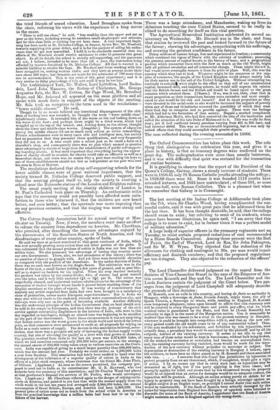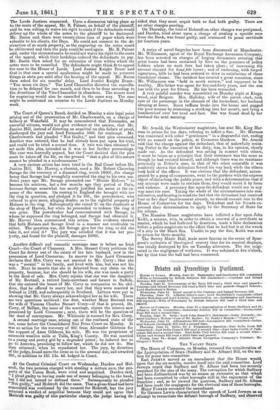The Lord Chancellor delivered judgment on the appeal from the
decision of Vice-Chancellor Stuart in the case of the Emperor of Aus- tria versus Kossuth and Day and Co. The Lord Chancellor and the Lords Justices sustain the judgment of the Court below. Two pas- sages from the judgment of Lord Campbell will adequately describe the grounds of this decision : M. Kossuth, now an exile in this country, and having de facto no authority in Hungary, while a Sovereign de facto, Francis Joseph, reigns there, the ally of Queen Victoria, a Sovereign to whom, while residing in England, M. Kossuth owes temporary allegiance, takes upon himself to affirm that this monetary note will be received in every Hungarian State and public pay-office, that its whole nominal value is guaranteed by the State, and that he (Louis Kossuth) has authority to sign it in the name of the Hungarian nation. Can it reasonably be doubted that this was meant to be a rival to the present currency in Hungary, wherever it could be brought into competition with it, and that as the new cur- rency gained credit the old would cease to he of any commercial value? Thus, if the acts meditated by the defendants, and forbidden by this injunction, were actually done, pecuniary loss would he sustained by the plaintiff, and by all his subjects, holders of the existing currency. It seems to me • idle to say that many tons of these notes would be kept in warehouses, without bulk being broken, till the wished-for revolution or restoration had become an accomplished fact; and, the existing currency having vanished, room would be made for the intro- duction of the new currency without prejudice to sovereign or subject. The depreciation or destruction of the existing currency in Hungary I believe, upon the evidence, to have been an object aimed at by M. Kossuth and those associated with him. . . . I conceive that this Court bas jurisdiction by injunction to protect property from an act threatened, which, if completed, would give a right of i
The Lords Justices concurred. Upon a discussion taking place as to the costs of the appeal, Mr. R. Palmer, on behalf of the plaintiff said he was willing-to waive his right to costs if the defendants would deliver up the whole of the notes to the plaintiff to be destroyed. Mr. Bacon said there were twenty-three tons of paper which were valuable to his clients, the Days. He could not consent to the de- struction of so much property, as the engraving on the notes could be obliterated and then the pulp could be usedagain. Mr. R. Palmer said, under the circumstances he could not waive his right to the costs of the appeal, which their lordships ordered the defendants to pay. Mr. Bacon then asked for an extension of time within which the notes were to be cancelled. The defendants might think fit to appeal the case to the House of Lords. Lord Justice Knight Bruce said that in that case a special application might be made to preserve things is state quo until after the hearing of the appeal. Mr. Bacon then asked for six months' delay. Lord Justice Knight Bruce : "You Mean six days." The Lord Chancellor directed the cancella- tion to be delayed for one month, and then to be done according to the directions of the Vice-Chancellor in chambers. The stones used for engraving would also be cancelled in the same way. The case might be mentioned on minutes to the Lords Justices on Monday week.































 Previous page
Previous page